French
UCAS code R120
- Study mode
- Full-time
- Duration
- 4 years
- Start date and application deadlines
-
- Start date
UCAS code R120
As one of the world's most important languages both in terms of speaker numbers and its role in science, industry and international diplomacy, studying French opens up a world of opportunities and prospects.
Fluency in French opens up dynamic and fast-changing parts of the world outside Europe, including North Africa, Sub-Saharan Africa, as well as parts of the Caribbean, the Indian Ocean and the Pacific. A mastery of this language brings with it access to cultural products including world literature and cinema, but also important social, cultural, historical and linguistic debates.
At Liverpool, French can be taken from A level or as a beginner’s language, with no previous qualifications necessary. Our vibrant programmes are designed to both refresh and extend your knowledge of French, with the perfection of language skills at the heart of our degrees. We also actively foster in our students the development of professional skills in French.
All our degrees demand a full intellectual engagement with a wide selection of areas in French studies. You will study French both in and beyond France, as well as aspects of French studies from various social, historical, visual, literary, filmic and linguistic aspects.
All students will spend one year in a French-speaking country as a language assistant in a school, student at a partner university, or on a work placement. If you combine French with a minor in another language, you will split the year between a French-speaking country and another country.

We’re proud to announce we’ve been awarded a Gold rating for educational excellence.
Discover what you'll learn, what you'll study, and how you'll be taught and assessed.
In year one, you will study language modules as well as foundation modules, which will introduce you to a range of topics in French history, culture and linguistics. You will also take a ‘language awareness’ module which is designed to support your language learning by sensitising you to issues in language and linguistics.
Students take 30 credits of required modules and 15 credits of optional modules in each semester. Language modules must be taken in pairs.
Student must take EITHER FREN112 and FREN134 OR FREN105 and FREN106.
Students with A Level French or equivalent should normally take FREN105 and FREN106. Students with no previous experience of learning French, or with qualifications below A Level should normally take FREN112 and FREN134.
Students may take another language as part of their optional modules if they wish.
Programme details and modules listed are illustrative only and subject to change.
During your second year you will take language modules, plus content modules which cover the spectrum of French studies – from French film and texts discussing the New World, to contemporary French sociolinguistics, French cinema, fashion in France, and collaboration during the Second World War.
Language modules should continue from those taken in Year 1 (i.e. students who took FREN112 and FREN134 should take FREN256 and FREN278; students who took FREN105 and FREN106 should take FREN207 and FREN208).
In addition, students take 45 credits of optional modules in each semester.
MODL200 is subject to a suitable placement being sourced.
Up to 15 credits of optional modules may be taken from cognate subjects elsewhere in the School of Histories, Languages and Cultures with prior permission from the Subject Lead.
| Compulsory modules | Credits |
|---|---|
| INTERMEDIATE FRENCH 5+6, YEAR 2 (FREN256) | 15 |
| ADVANCED FRENCH 7+8 (FREN278) | 15 |
| ADVANCED FRENCH 7, YEAR 2 (FREN207) | 15 |
| ADVANCED FRENCH 8 (FREN208) | 15 |
Programme details and modules listed are illustrative only and subject to change.
You will spend one year in a French-speaking country as a language assistant in a school, as a student at a partner university, or on a work placement. If you combine Major French with a Minor in another language, you will split the year abroad between a French-speaking country and another country.
Assessment during your year abroad
You will complete assessment tasks appropriate to your year abroad placement, either producing one or more pieces of work in French or completing modules at your host university.
Programme details and modules listed are illustrative only and subject to change.
During your final year you will take language modules, plus content modules which cover the spectrum of French studies – from French film and texts discussing the New World, to contemporary French sociolinguistics, French cinema, fashion in France, and collaboration during the Second World War.
Students take 15 credits of required modules and 45 credits of optional modules in each semester.
Students can only take one of MODL321, MODL322 or MODL307.
| Compulsory modules | Credits |
|---|---|
| PROFICIENT FRENCH 11 (FREN311) | 15 |
| PROFICIENT FRENCH 12 (FREN312) | 15 |
Programme details and modules listed are illustrative only and subject to change.
If you split your degree between French and another subject area, you will study a French language module, at beginners’ or advanced level, and a cultural module per semester, alongside two other modules in your other subject.
If you combine French with a non-language subject, you will spend the year abroad in a French speaking country as an assistant in a school, as a student at a university or on a work placement. If you combine French with another language, you will split the year abroad between the two countries.
You will be taught in a mixture of formal lectures, seminars and small group tutorials where a friendly environment prevails and great attention is paid to giving feedback on assessed work.
In language classes, we make every effort to ensure that we have a small number of students compared to competitor institutions, which means that academic staff are able to support students to achieve their full potential. All language modules involve continuous assessment such as oral presentations, listening tests and grammar tests as well as exams. Tuition takes place in small groups with first-language speakers playing a prominent part and includes a range of skills such as listening, writing, speaking, interpreting and translation.
Students are also expected to make regular use of our fully-refurbished Language Lounge to enhance their own study. We encourage our students to become independent learners, and support them through our dedicated library resources in the Sydney Jones Library which is open 24-hour in term time. We also make extensive use of our virtual learning environment VITAL where students can complete structured tasks outside the classroom.
Performance throughout the year is carefully monitored and used to supplement examinations. For language, such a programme of continuous assessment involves evaluating performance in a variety of written and oral exercises. Other modules have a mix of essay and exam assessment. Our aim is always to assess by methods of evaluation appropriate to the skills being developed and to allow students to gain credit for good work done during the year.
Exams take place at two points in the academic year: at the end of semester one in January and at the end of the session in May, so that the workload is evenly distributed. As regards the final degree result, for language programmes, the second year’s work counts for 20%, the work done during the year abroad (foreign exams or extended essay or portfolio) counts for another 10%, and the final year’s work counts for 70%.
We have a distinctive approach to education, the Liverpool Curriculum Framework, which focuses on research-connected teaching, active learning, and authentic assessment to ensure our students graduate as digitally fluent and confident global citizens.
The Liverpool Curriculum framework sets out our distinctive approach to education. Our teaching staff support our students to develop academic knowledge, skills, and understanding alongside our graduate attributes:
Our curriculum is characterised by the three Liverpool Hallmarks:
All this is underpinned by our core value of inclusivity and commitment to providing a curriculum that is accessible to all students.
The qualifications and exam results you'll need to apply for this course.
| Qualification | Details |
|---|---|
| A levels |
BBC |
| BTEC Level 3 national extended diploma |
DDM. |
| BTEC combinations |
BTEC National Diploma DM plus B at A level; BTEC National Extended Certificate M plus BB at A level. |
| Welsh Baccalaureate Advanced |
C in the Welsh Baccalaureate, plus BB at A level. |
| Access |
Pass relevant Access to HE Diploma with 45 Level 3 credits with 27 at Distinction and 18 at Merit. |
Studying with us means you can tailor your degree to suit you. Here's what is available on this course.
University of Liverpool students can choose from an exciting range of study placements at partner universities worldwide.
Broaden your world by spending an additional year of study at a partner university abroad following your second year of study.
Every student at The University of Liverpool can study a language as part of, or alongside their degree. You can choose:
With a combined degree, you can study two subjects as part of the same degree programme.
Teaching is delivered by the Department of Languages, Cultures and Film, who bring together experts in a wide range of disciplines. A cutting edge research programme and award-winning teaching provide great opportunities to study all aspects of language and culture within a global context.
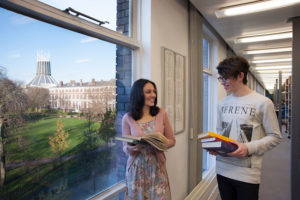
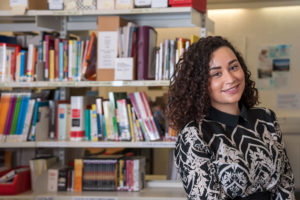
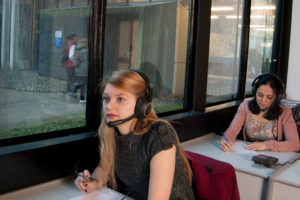

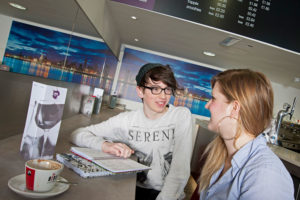
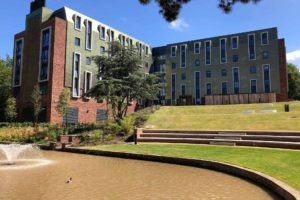
Engage with topical historical, cultural and topical debates.
From arrival to alumni, we’re with you all the way:
What is great about languages is that you get a lot of time to work outside contact hours. The teaching here is diverse, I've studied so much more than language and vocabulary. I've explored literature, history, cinema and socio-linguistics, all linked in some way to France or the Francophone world.

Want to find out more about student life?
Chat with our student ambassadors and ask any questions you have.
Our Language students chat about their experiences on a language degree programme.
French graduates have the opportunity to gain employability skills and work experience, with a curriculum that delivers the skills employers are looking for. The Year Abroad also offers an opportunity to develop international experience as part of their degree studies.
French graduates go on to careers in all sectors worldwide, including:
Many of our students also undertake postgraduate study, either in our own department or for example, on a PGCE translation or law conversion course.
82% of languages, cultures and film students are in work and/or further study 15 months after graduation.
(Discover Uni, 2018-19.)
Hear what graduates say about their career progression and life after university.
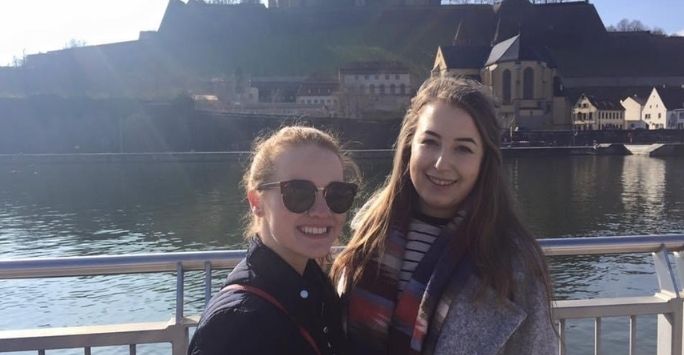
Two best friends talk about their different professional journeys 5 years after graduating from studying languages at the University of Liverpool. Eloise tells us about her time working for American Airlines.

Two best friends talk about their different professional journeys 5 years after graduating from studying languages at the University of Liverpool. Jessica tells us about her time working with Teach First, a charity that develops and supports teachers.
Your tuition fees, funding your studies, and other costs to consider.
Full-time place, per year - £9,535
Year abroad fee - £1,430 (applies to year in China)
Full-time place, per year - £24,100
Year abroad fee - £12,050 (applies to year in China)
The tuition fees shown are correct for 2025/26 entry. Please note that the year abroad fee also applies to the year in China.
If you are participating in a Study Abroad programme you will still be entitled to all of your normal student loans – and you may be entitled to extra funding from Student Finance. If you are studying a semester abroad, your normal tuition fee will be payable. If you are studying a full year abroad, your tuition fee for that year is reduced. All students participating in Study Abroad are entitled to University of Liverpool travel insurance.
Information about funding opportunities available for Study Abroad.
We understand that budgeting for your time at university is important, and we want to make sure you understand any course-related costs that are not covered by your tuition fee. This could include buying a laptop, books, or stationery.
Find out more about the additional study costs that may apply to this course.
We offer a range of scholarships and bursaries that could help pay your tuition and living expenses.
If you’re a UK student joining an undergraduate degree and have a household income below £35,000, you could be eligible for a Liverpool Bursary worth up to £2,000 for each year of undergraduate study.
Apply for an Asylum Seekers Scholarship and you could have your tuition fees paid in full and receive help with study costs. You’ll need to have applied for asylum in the UK, or be the dependant of an asylum seeker, and be joining an eligible undergraduate degree.
If you’ve spent 13 or more weeks in Local Authority care since age 14, you could be eligible for a bursary of £3,000 per year of study. You’ll need to be a UK student joining an eligible undergraduate degree and be aged 28 or above on 1 September in the year you start.
Are you a UK student with a Black African or Caribbean heritage and a household income of £25,000 or less? You could be eligible to apply for a Cowrie Foundation Scholarship worth up to £8,000 for each year of undergraduate study.
If you’re a UK student identified as estranged by Student Finance England (or the equivalent UK funding body), you could be eligible for a bursary of £1,000 for each year of undergraduate study.
Joining a School of Biosciences degree and have a household income of less than £25,000? If you’re a UK student, you could apply to receive £4,500 per year for three years of your undergraduate course.
Do you live in the Liverpool City Region with a household income of £25,000 or less? Did neither of your parents attend University? You could be eligible to apply for a Nolan Scholarship worth £5,000 per year for three years of undergraduate study.
Are you a UK student with a household income of £25,000 or less? If you’ve participated in an eligible outreach programme, you could be eligible to apply for a Rigby Enterprise Award worth £5,000 per year for three years of your undergraduate degree.
Are you a UK student with a household income of £25,000 or less? Did neither of your parents attend University? You could be eligible to apply for a ROLABOTIC Scholarship worth £4,500 for each year of your undergraduate degree.
Apply to receive tailored training support to enhance your sporting performance. Our athlete support package includes a range of benefits, from bespoke strength and conditioning training to physiotherapy sessions and one-to-one nutritional advice.
Joining a degree in the School of Electrical Engineering, Electronics and Computer Science? If you’re a UK student with household income below £25,000, you could be eligible to apply for £5,000 a year for three years of study. Two awards will be available per academic year.
If you’re a young adult and a registered carer in the UK, you might be eligible for a £1,000 bursary for each year of study. You’ll need to be aged 18-25 on 1 September in the year you start your undergraduate degree.
Use our handy chatbot for your Clearing enquiries.
Last updated 17 June 2025 / / Programme terms and conditions